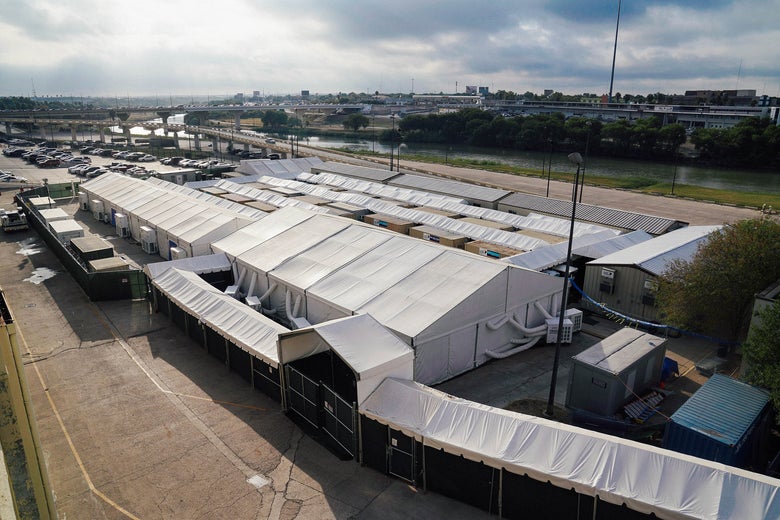
Soft-sided immigration court tents in Laredo, Texas, on Oct. 9.
Veronica Cardena/Reuters
The administration seeks to end virtually all asylum in the United States. As it rolls out a dizzying number of new rules and laws intended to deny asylum-seekers protection, the administration has also limited journalists’ access, making it much harder to keep up with what’s truly happening in our immigration system. And it is silencing those best equipped to speak out: asylum officers, immigration judges, and immigration enforcement attorneys.
We teach at law schools across the country. In past years, immigration judges, Immigration and Customs Enforcement attorneys, and asylum officers have visited our classes to speak about immigration law and policy. We enthusiastically welcomed their voices in our classrooms. As in our democracy, success in our classrooms depends on engaged participation and a robust exchange of ideas. Our students’ political perspectives run the gamut, yet in the classroom we have a shared goal to earnestly and honestly examine the underpinnings of immigration law, policy, and practice.
But things have recently changed. When we’ve asked judges, ICE attorneys, and asylum officers to visit our classes, almost all have declined. They’ve told us they can’t speak with our classes even on their days off, even in their personal capacities, without prior clearance and approval from high-level supervisors—approval that is increasingly difficult to obtain. This silencing of line officers is a marked departure from past years. It is taking place across the country, and it is no coincidence. The administration has denied these civil servants permission to speak publicly. According to former immigration judge Jeffrey Chase, immigration judges “are not even allowed to speak at conferences or law schools, because the administration does not consider them qualified to speak on behalf of the agency or its policies.”
In truth, these agency decision-makers are the most qualified to talk about how the administration’s policies play out in their courtrooms and before the immigration agency. The loss of their perspectives hurts, not only for the knowledge they can impart but because many of our students look to government immigration attorneys as mentors and role models as they hope to become public servants after law school.
In recent weeks, the nation has scrutinized the administration’s efforts to silence whistleblowers who have information about potentially impeachable offenses. Yet these are not the only civil servants who have valuable information. The silencing of immigration officials is all the more troubling when seen through the broader lens of the administration’s efforts to end asylum, diminish transparency within the federal government, and increase partisan measures to interfere with public servants’ abilities to simply do their jobs. The limitations on judges and immigration officers’ abilities to educate students about the immigration legal system coincides with other Department of Justice efforts to gut judicial independence within immigration courts.
On Aug. 9, the U.S. Department of Justice took steps to decertify the National Association of Immigration Judges, the independent union for immigration judges. Such a move would not just affect the daily working conditions of immigration judges, but also give the politically appointed attorney general more power to fire immigration judges whose rulings the administration deems out of step with its anti-immigrant policies.
Since President Donald Trump took office, the jobs of immigration judges have become increasingly arduous and influenced by the president’s agenda. New immigration judges have been told in trainings that they are not just judges because they are “employees of the United States Department of Justice.” Essentially, they are being told to act as prosecutors in judges’ robes in a system that does not offer immigrants—even children—the right to counsel. They are under immense pressure to deny and deport immigrants quickly, in spite of constitutional due process requirements and the potential merit of their cases.
None of this is an accident: Judges and asylum officers are being instructed to decide cases in ways that many contend are contrary to law. A virtual gag rule has been placed on them in the context of law schools and the broader public. This denies information to coming generations of lawyers and eliminates public discourse on some of the most critical civil rights issues of our time. Decertification of the judges’ union would disempower adjudicators even more. The current campaign to dismantle independent decision-making and legal interpretation in the asylum system, and in our immigration courts generally, will carry consequences well beyond this administration’s lifespan. Free speech, especially by civil servants, is fundamental to a healthy democracy. Suppression of such free speech tilts us closer to an authoritarian state.
Readers like you make our work possible. Help us continue to provide the reporting, commentary and criticism you won’t find anywhere else.
Join Slate Plusfrom Slate Magazine https://ift.tt/32LrH4P
via IFTTT
沒有留言:
張貼留言